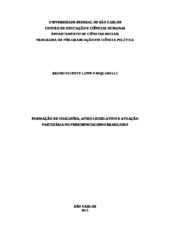Formação de coalizões, apoio legislativo e atuação partidária no presidencialismo brasileiro
Abstract
The interaction between the Executive and the Legislative in the Brazilian presidential system has been ruled by two antagonistic approaches. The first one examines that the relations between both powers would be ruled by confronting each other and by irreconcilable interests. This is because a combination of the presidential system, multipartidarism, open-list proportional representation system and federalism would induce to the formation of a clientelistic Congress, which would be undisciplined and dominated by weak political parties. The second perspective reinforces the high level of cooperation in the relations between those powers due to the centralization which rules the legislative work, and due to the executive and the partisan leaders´ preponderance in the ruling process, allowing the establishment of an enduring coalition. From these considerations, this study analyzes how the Brazilian presidential system was run during Luiz Inácio Lula da Silva government (2003-2010) by two main aspects: firstly, the notable cooperation between the Executive and the Legislative powers visualized in the formation of coalitions, in the allocation of ministry positions and in the election for the main legislative positions, such as the presidencies of the House of Representatives, Federal Senate and Permanent Committees; and, secondly, the evident participation of the political parties of the situation and the opposition through reports by the legislators of the National Congress Committees, as well as the action throughout amendments and replacements. Thus, it has been proved that Lula government was supported by enduring and disciplined coalitions which, then, had the main executive and legislative positions. Furthermore, it has been verified that the Legislative power does not ratify all the propositions derived from the Executive power, because it has actuated in the committees by altering them. Consequently, cooperation was constant in the ruling process, but the negotiation and conflict were also indispensable factors for a better performance of the system official duties.
